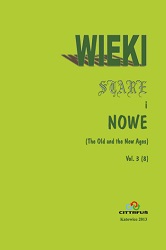Utworzenie księstw raciborskiego i opolskiego, Z problematyki pierwszego podziału Śląska w drugiej połowie XII wieku
The formation of Racibórz and Opole Duchy From the first division of Silesia in the second half of the 12th century
Author(s): Jerzy RajmanSubject(s): History
Published by: Wydawnictwo Uniwersytetu Śląskiego
Summary/Abstract: The very article presents the arguments questioning a currently accepted interpretation of Silesian Chronicle that it was Mieszko Plątonogi that attacked Bolesław Wysoki, his olderbrother in 1172. In my opinion, Mieszko possessed his own duchy with the capital in Racibórz between 1166 and 1170, and the person who removed Bolesław Wysoki from Wrocław was Mieszko Stary. Such a conviction is in accordance with contemporary German sources. The position of Mieszko Plątonogi against his older brother dates back to 1177. Insignificant source basis does not allow for defining the exact time of ascribing Opole Duchy to Jarosław, the oldest son of Bolesław Wysoki. In this article I am trying to show weak points in the hypothesis by J. Bieniak who dates the formation of this duchy to 1175. I assume that Jarosław acted against his father as late as in 1177. What can be established is the fact that before Jarosław became the bishop in Wrocław in 1198 he had already been the prince of Opole, which one can assume on the basis of the authentic document of Henryk Brodaty (widely discussed in the article). In contrast to J. Bieniak who questions the existence of the state of war between Mieszko and Henryk, I think that Mieszko received from his brother Bolesław the record of Opole territory after his death. In the first half of 1202 it was Henryk Brodaty who beat him to the inclusion of Opole, but Mieszko excluded him from Opole and threatened his ruling in Wrocław. The conflict ended in 1202 thanks to the intervention of Innocent III, the Pope. The Pope confirmed Mieszko’s legal possession of ‘Grody i ziemie’ (Castles and lands) in the bull from 1202, under the general statement of which stands undoubtedly the Polish land. Instead, prince Mieszko had to promise that he would not exclude Henryk from his homeland, that is, Wrocław Duchy.
Journal: Wieki Stare i Nowe
- Issue Year: 8/2011
- Issue No: 3
- Page Range: 59-88
- Page Count: 30
- Language: Polish

